Bible
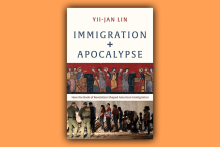
The U.S. has always considered itself as this New Jerusalem — a land specially blessed by God — but also one that is only available to those specially chosen. And from the establishment of the United States as a nation, as Lin discusses, this drive to only welcome certain individuals has been heavily focused on questions of race and national origin. The notion that the U.S. is a nation that welcomes immigrants is a myth that contradicts historical record. Instead, our “[i]mmigration and naturalization laws serve ultimately to create the ideal population as conceived by those who set policy and legislate,” Lin writes.
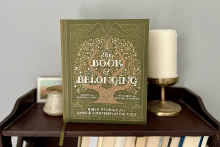
Early in The Book of Belonging, a long-anticipated children’s story Bible, author Mariko Clark includes this paragraph: “Think about how cozy and special you feel when someone asks you about your day or wants to learn more about your favorite foods or hobbies. God made us to belong with God! That means God wants to be close and cozy with us. So all questions are welcome!”
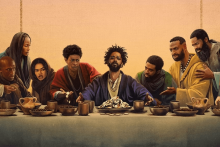
Director Jeymes Samuel’s newest movie, The Book of Clarence, is not just a biblical epic but a Black biblical epic.

My seminary students are eager to confront the challenge Christian nationalism poses, including its simplistic use and cynical abuse of biblical texts. Christian nationalists wield the Bible as if it were a static authority, perverting its vision of peoplehood to emphasize homogeneity. Yet the biblical writings themselves are characterized by lively exchanges, competing perspectives across multiple generations, and appeals to care for the stranger.

Book-banning has always been about censoring the stories, histories, and information that push us to question the status quo.

In the beginning, Ruth Handler created Barbieland. And Ruth said, “Let there be pink,” and there was pink.

I know some Christians do not fully share my theological convictions about gender and sexuality, but on issues of human dignity and civil rights, the church should be firmly united: Transgender and nonbinary siblings are God’s children made in God’s very image and likeness. Prohibiting lifesaving medical care, tolerating discrimination, or denying someone the ability to use their name is wrong; you cannot deny people those rights because you disagree with their beliefs about gender or sexuality. Christians should be standing in the breach in defense of the full humanity, dignity, and rights of their trans siblings.
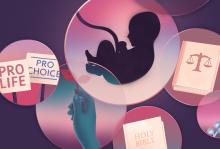
THE REPRODUCTIVE HEALTH landscape in the United States has changed drastically in the last year, and it continues to change. But some things remain the same. One consistent aspect of our ongoing national conversation is that many of those who support the greatest restrictions, including on access to abortion and other elements of reproductive health, claim Christian faith as a primary motivator.
I spent much of my young adulthood in evangelical contexts where people had strong opinions about faith and reproductive rights. Most evangelicals I knew believed that life begins at conception and thus abortion should be broadly prohibited by the law as akin to murder. In these spaces, the Bible was considered the main — sometimes the only — source of authority when it came to navigating ethical questions. I’ve come to realize, though, that the Bible hardly speaks anything straightforward into the intensely personal realm of when human life begins and what decisions should be made in complicated, real-world situations.
I wonder, then: What does it look like to wade through this murky territory as people of faith? Who are Christians called to be in a post-Roe world?

The following is an act of imagination. It is an attempt to fill in the gaps that are left for us in this story to bring the text to life. My hope is that this could be used as a resource for family Christmas Eve devotions or for congregations looking to creatively imagine the birth of Christ.

Societally we focus a lot on spanking, I think, because it seems to draw such a line between barbarism and civility, or, seen from the other perspective, between parents who are serious about discipline and those who are wishy-washy. But spanking isn’t the issue behind the issue. The issue behind the issue is authority — the right to exercise power.

I was amazed at the grassroots leaders, mainly women, working to deliver that desperately needed good news to their communities. Their witness was particularly poignant given the patriarchal context in which they worked. Many of the government officials we met with were men who seemed focused on who would get what in the region’s future; the women we met were empowering people in their communities to create change.

“I hate, I despise your vigils,
and I take no delight in your school shooter drills.
Even though you offer me your thoughts and prayers,
I will not accept them;
and the offerings of well-being of your collection plates
I will not look upon.”
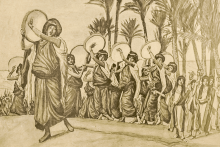
The women, in their songs, engage their community with authority, devotion, resolve, and assurance, offering praise for God’s work among and with them.

In Genesis 2, after spending six days forming the earth, God rests “from all the work,” setting a sacred precedent. In Exodus 20:8-10, God instructs the Israelites to embrace patterns of rest. In Matthew 8:23-26, Jesus rests in a boat during a torrential downpour, despite tides rising and crashing against the boat’s hull, threatening to capsize the passengers. We can take comfort in this: If the son of God needed to take a break every now and then, so do we.

Jesus’ “mission statement” when he begins his public ministry in Galilee includes a promise of liberation and release for those who are incarcerated. While the New Testament context of “captivity” wasn’t entirely the same as modern imprisonment, Jesus’ promise aligns liberation of prisoners with healing and good news for the poor and oppressed. Taking Jesus’ words in this text seriously forces us to ask: If God’s reign is characterized by freedom for prisoners, why are we supporting incarceration now?

Horror has always leaned on religion to provide the backbone for its explorations of evil, even before the first time Dracula cowered in fear at the sight of a cross. But religion doesn’t just inspire the horror genre, it utilizes it, too. The Bible is full of horror.
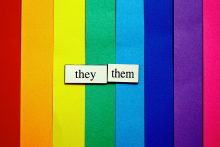
Most English translations of the Bible use exclusively masculine pronouns to refer to God, and the presumed maleness of God has become the default mindset of many Christians. But does the precedence of masculine pronouns require Christians to refer to God only with masculine pronouns forever?

The Bible has more to say about women in leadership positions than we are often led to believe, and with the exception of that pesky little 1 Timothy passage, the biblical narrative about women leaders is overwhelmingly positive. Let’s take a look at 10 examples.

“Saint Augustine, a saint of my church, wrote that a people was ‘a multitude defined by the common objects of their love,’” Biden said. “What are the common objects we, as Americans, love, that define us as Americans? I think we know: opportunity, security, liberty, respect, honor, and, yes, the truth.”

Vice President Mike Pence said in a letter to House Speaker Nancy Pelosi on Tuesday he is opposed to invoking the 25th Amendment to remove President Donald Trump from office. In the letter, Pence quotes from Ecclesiastes.